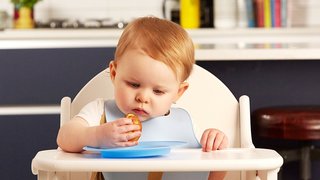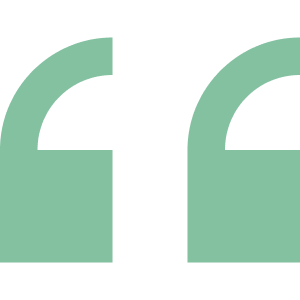Betty
Mum to Ezra
How to start weaning your baby
Lots of parents wonder when and how to start introducing solid foods – with so much conflicting advice available it can be very confusing.
You should wait until your baby is around 6 months old. This gives them time to develop properly, so they can cope with solid food.
Why wait until my baby is around 6 months?
Introducing your baby to solid food starts when they're around 6 months old. This is because:
- breast milk or first infant formula provides the energy and nutrients needed until around 6 months (breastfeeding women should consider taking a daily vitamin D supplement)
- it gives your baby time to develop so they can cope fully with solid foods
- your baby is more able to feed themselves
- they'll be better at moving food around their mouth, chewing and swallowing – this may mean they can have mashed, lumpy and finger foods (and may not need smooth, blended foods at all)

What are the signs my baby may be ready to start weaning?
There are 3 clear signs, which, when they appear together from around 6 months of age, show that your baby is ready for their first solid foods, alongside breast milk or first infant formula.
Signs your baby may be ready to start weaning
-
stay in a sitting position, holding their head steady
-
coordinate their eyes, hands and mouth so they can look at their food, pick it up and put it in their mouth
-
swallow food (rather than spit it back out)
Behaviours that can be mistaken for signs of being ready
-
chewing fists
-
wanting extra milk feeds
-
waking up in the night (more than usual)
These fist-chewing, wanting extra feeds and waking up in the night are normal baby behaviours and not necessarily a sign of hunger or being ready to start solid food.
Starting solid foods will not make your baby any more likely to sleep through the night. Sometimes a little extra milk will help until they are ready for food.
If your baby was born prematurely, ask your health visitor or GP for advice on when to start weaning.

It's really important to wait until your baby is ready before weaning. I have not started weaning Ezra until now because he has been too young and not able to sit up for long enough. He can now stay in a sitting position and pick things up, which lets me know he is ready.
How much will they eat?
How much your baby eats depends on their appetite, so let your baby guide you on how much food they need – never force them to eat.
In the same way you follow your baby's cues when offering them breast or bottle feeds, be responsive to your baby when giving them solid foods, and learn to recognise when they're hungry and when they've had enough.
Is there a good time of day?
The best time of day is the one that suits you both, when you do not feel rushed and your baby is not too tired.
Don't forget that eating is a whole new skill – your baby may take to it like a duck to water, or it might take them a while!
Allow plenty of time, go at your baby's pace and stop when they show signs they've had enough.
Fussy eater?
It may take 10 tries or more for your baby to get used to new foods, flavours and textures.
There will be days when they eat more, some when they eat less, and then days when they reject everything. Don't worry – this is perfectly normal.
Be patient and keep offering a variety of foods – even the ones they don't seem to like – and let them get used to it in their own time.
What you need
Here are some suggestions to get you started.
High chair
Your baby needs to be sitting safely and strapped in, in an upright position (so they can swallow properly).
First cup
Encourage your baby to sip water from a cup with their meals (instead of a bottle). Open cups or free-flow cups (without a valve) help your baby learn to sip and is better for their teeth.
Spoons
Soft weaning spoons, usually made of rubber or plastic, are easier on your baby's gums.
Plastic bowls
Ideally the ones with a suction base, otherwise they're likely to end up on the floor!
Ice cube trays
Very useful for batch-cooking and freezing small portions.
Bibs
Easy-to-clean plastic or pelican bibs are best in the beginning.
Messy mat
Or even newspaper under the high chair – handy for messy eaters!
